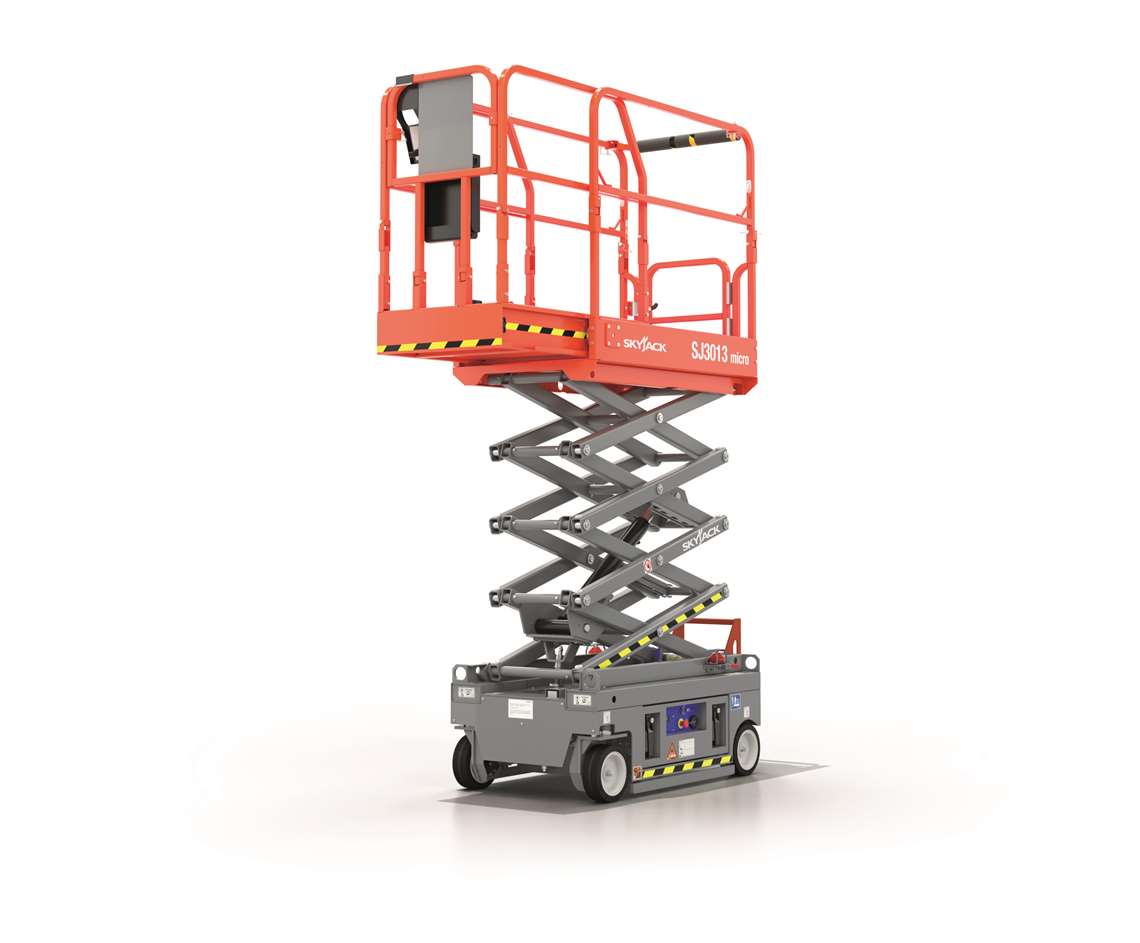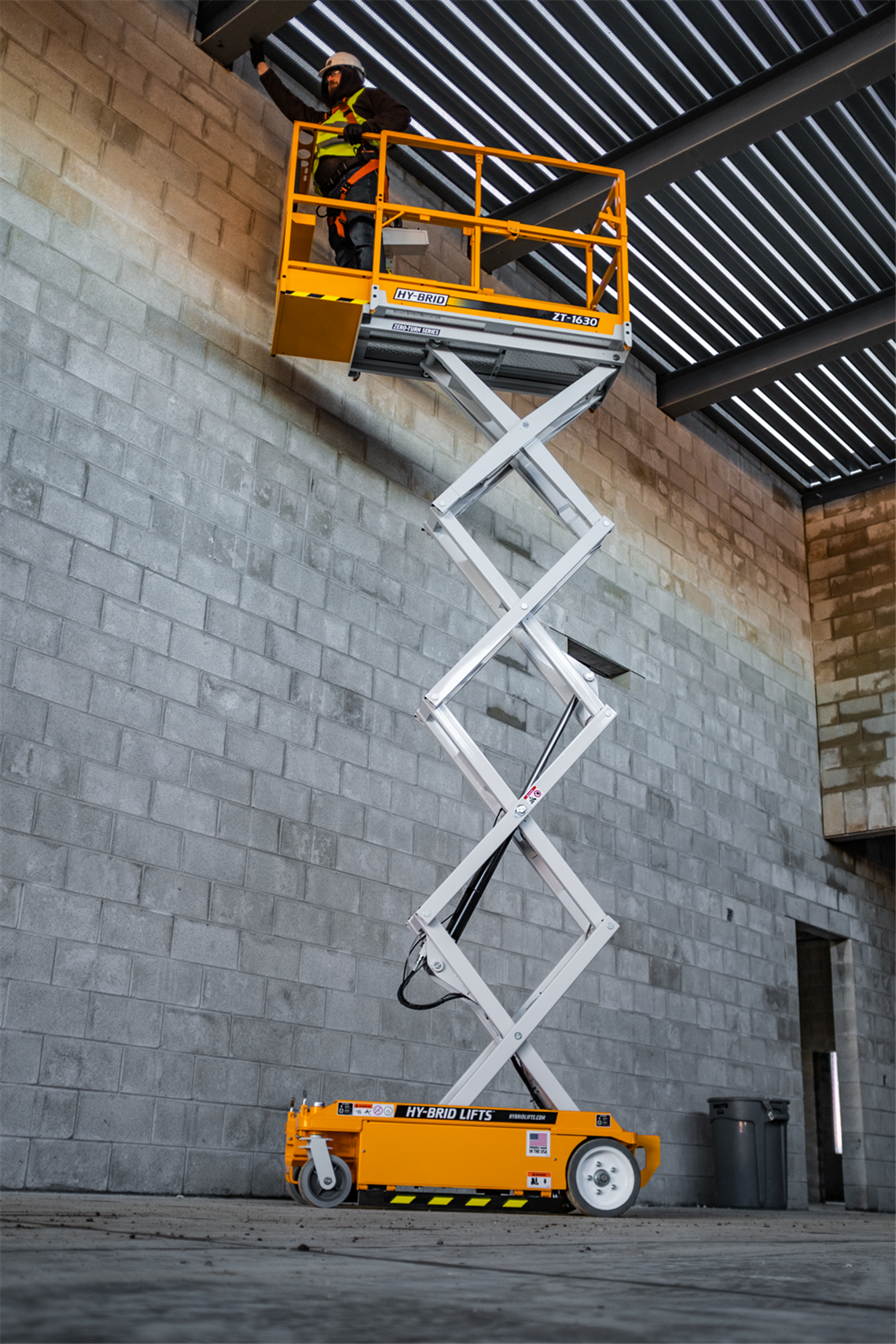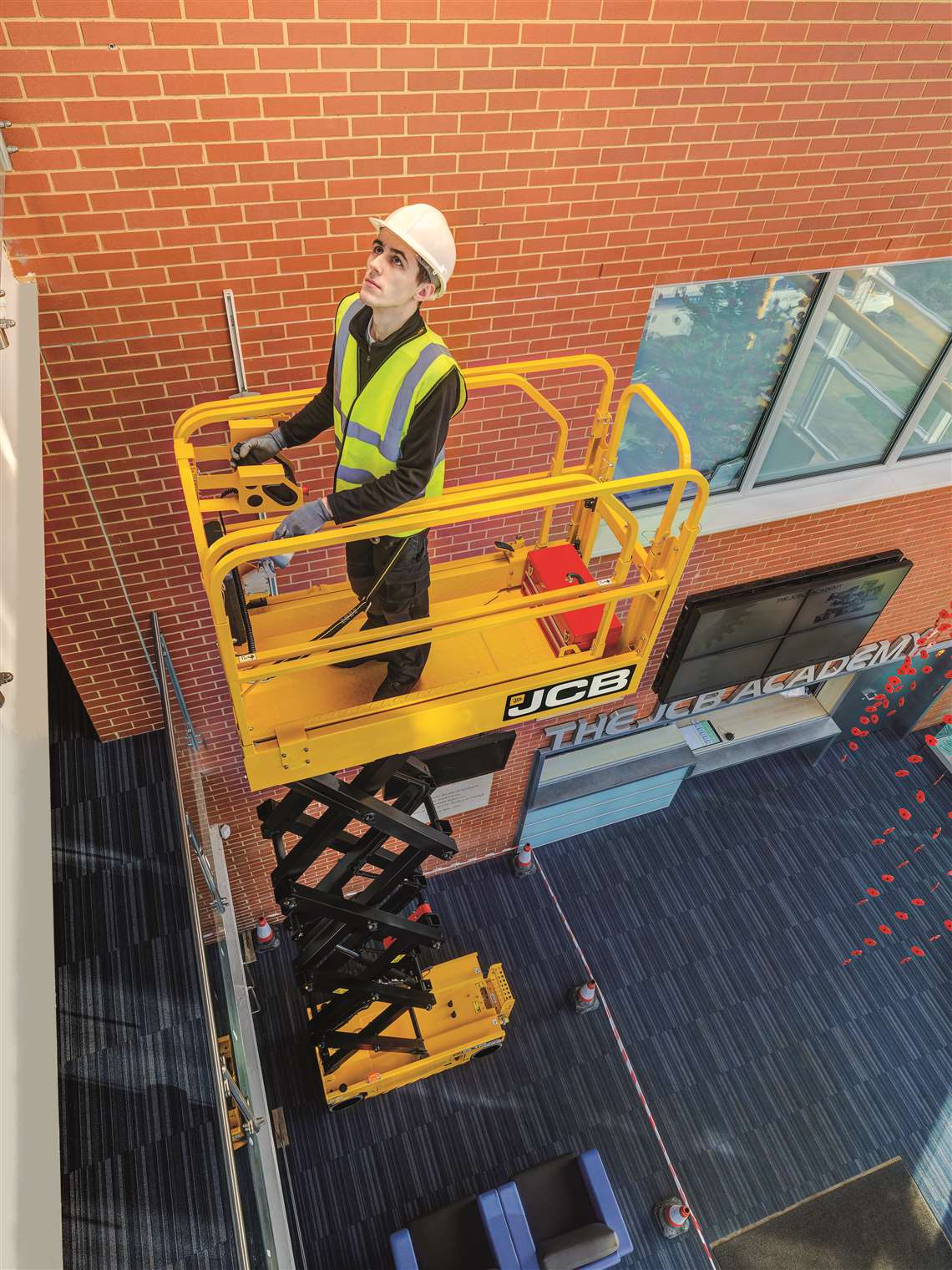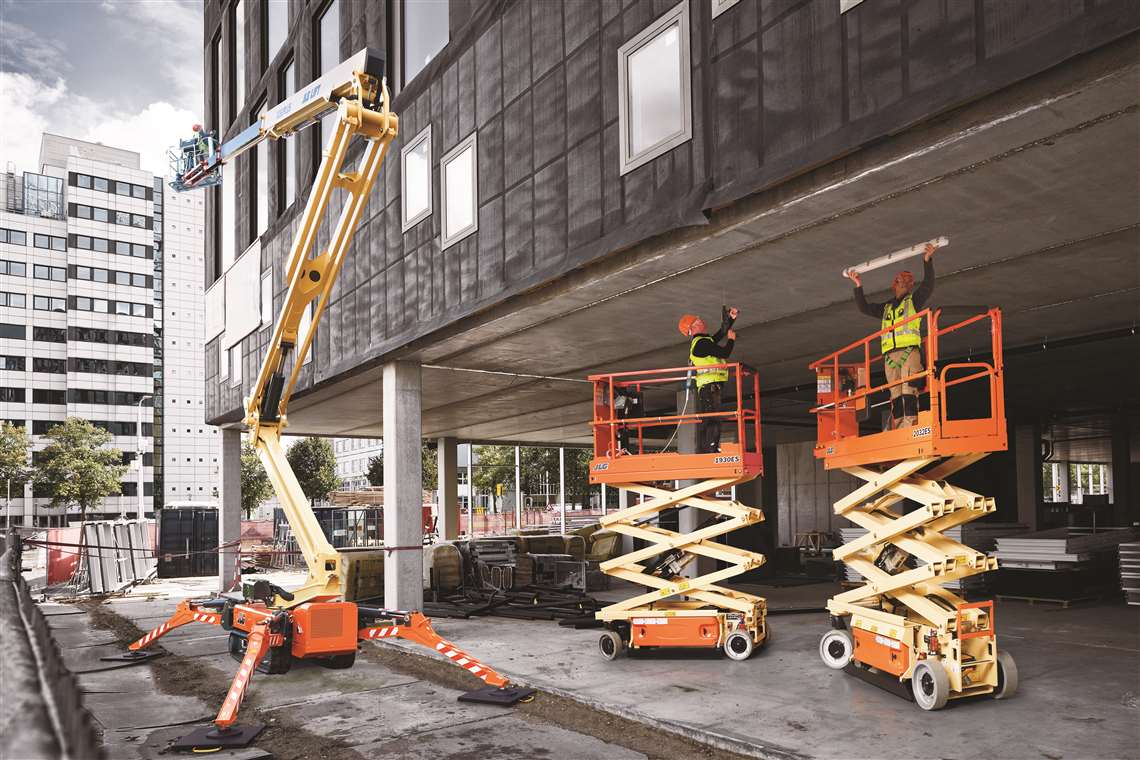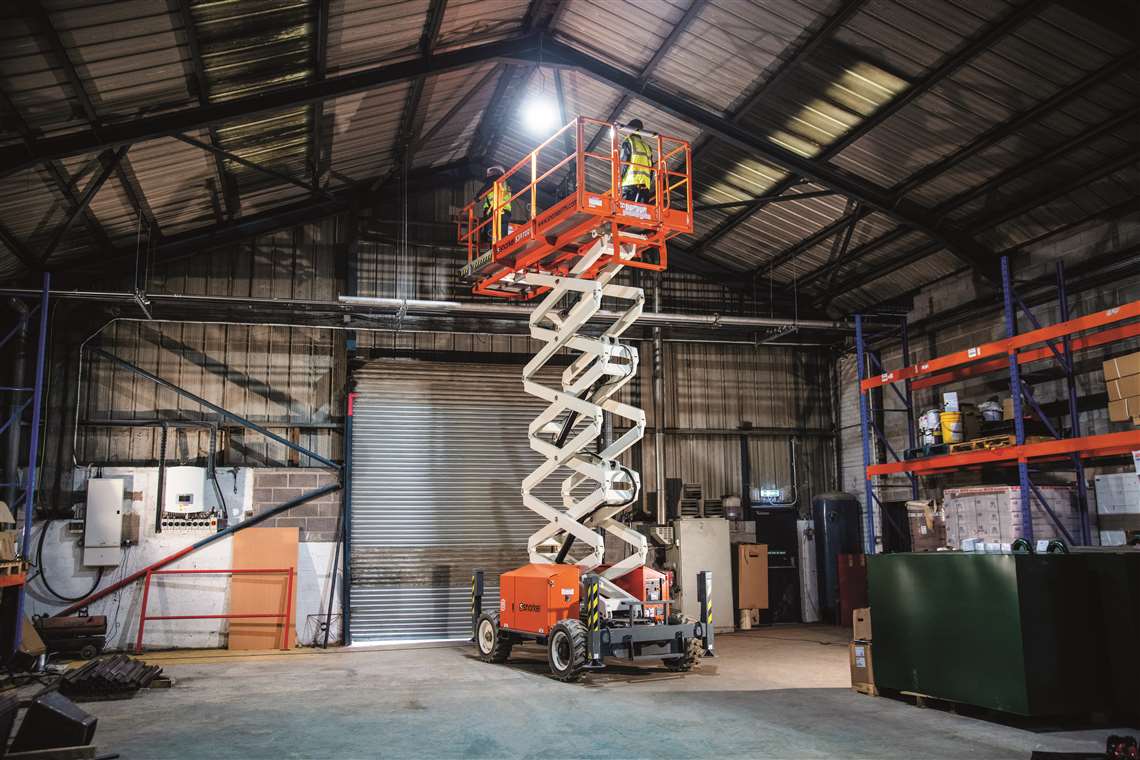14 March 2022
Over the last handful of years, equipment manufacturers have been working to provide greener and more environmentally friendly products – especially within the access sector. Aerial equipment’s use within indoor and environmentally sensitive areas, alongside its typically smaller stature, places this sector in a perfect position to accelerate the electrification push.
Of course, electric access equipment is nothing new and lead acid batteries have been powering slab scissors for decades. While lithium-ion is dubbed as the future, traditional lead acid will play a significant role, thanks to its relatively low cost and widely established presence in the global market. ALH wanted to dig a bit deeper into the lithium-ion pool so we asked manufacturers what the future looks like for electric scissors. Here’s what they had to say.
ALH: Scissor lifts have been electrically powered by lead acid batteries for decades. But a new entrant – lithium-ion – is becoming a more common power source. What benefits does lithium-ion present over lead acid?
Bob Begley, director of product management – scissor and vertical lifts, JLG: Lithium-ion batteries provide some significant performance features over lead-acid batteries that add a lot of value to the MEWP equipment market, such as quick charging. Most hydraulic-drive, as well as some electric-drive, scissor lifts on the market have a battery charge that lasts just a single shift — and takes 8-10 hours to completely charge. That means that nearly half a day, the machine is not usable. Some scissor lifts powered by a lithium-ion battery (or multiple li-ion batteries) can go from not charged to fully charged in much less time. For example, it only takes 3.5 hours for the single lithium-ion powered JLG DaVinci lift to fully charge with its standard 650W charger. With an optional 900W charger, it fully charges in 2.5 hours, making the machine usable for 20+ hours each day. Over the course of those 20 hours, the lithium-ion battery offers no performance degradation, unlike their flooded lead-acid (FLA) battery counterparts, which degrade as the percent of charge decreases. This delivers huge uplift potential when it comes to productivity for end-users, and it is important for rental companies as it means less charge time between rentals, resulting in improved utilization rates.
 Bob Begley, JLG
Bob Begley, JLG
Additionally, lithium-ion battery technology offers opportunity charging. For example, with as little as 30 minutes of charging, the JLG DaVinci lift can provide up to a couple hours of power for users to finish their work without damage to the battery. And with its quick-charge feature, in as few as 5 minutes, the lithium-ion battery can be charged enough to drive the machine 100-ft with enough torque to load it onto a truck. This eliminates the common occurrence of a machine not being charged when a driver arrives to pick it up, then having to plug it in and return later or the next day. With the quick charge feature, they can simply plug it in, wait 5 minutes, then get it up and onto the truck.
While some brands offer lithium-ion power, they require multiple batteries to run the equipment. So, while designing the DaVinci lift, JLG engineers worked to optimize every system on the lift to improve energy consumption and recover energy as the machine descends to maximize operational duration on a single charge. These optimizations are what allows the machine to successfully run with a single lithium-ion battery.
Although lithium-ion batteries have a higher upfront cost, they require significantly less maintenance than the deep cycle, flooded lead-acid batteries found in most traditional scissor lifts — so, JLG being able to offer an all-electric lift with a single lithium-ion battery is a big step forward for the industry.
With lithium-ion batteries you also eliminate the need to water the batteries, one of the most common causes of premature battery failure. This leads to fewer battery replacements; therefore, less downtime and ongoing costs associated with battery replacements.
 Corey Connolly, Skyjack
Corey Connolly, Skyjack
Another benefit to lithium-ion battery technology, as it relates specifically to JLG’s DaVinci scissor lift, is a 5-year warranty versus the 1-year warranty on lifts powered by FLA and AGM batteries.
Corey Connolly, product manager, Skyjack: Lithium-ion batteries provide a number of benefits over lead acid batteries, with the biggest being the comparative lack of maintenance requirements. Flooded lead acid batteries require regular maintenance, that unfortunately get ignored frequently resulting in battery failures and reoccurring replacement costs. One should remember that there are other low-maintenance options such as AGM batteries.
The initial cost of li-ion battery cells has traditionally limited demand for them on smaller equipment like electric scissors due to the impact it has on the overall machine cost. As the cost of the cells have come down, they have become a much more attractive option as the cost of battery replacements over the life of the machine is now starting to look higher than the initial acquisition cost of the li-ion batteries. Li-ion batteries also provide the possibilities for increased efficiencies and improved charging times; however, these things all come at a cost.
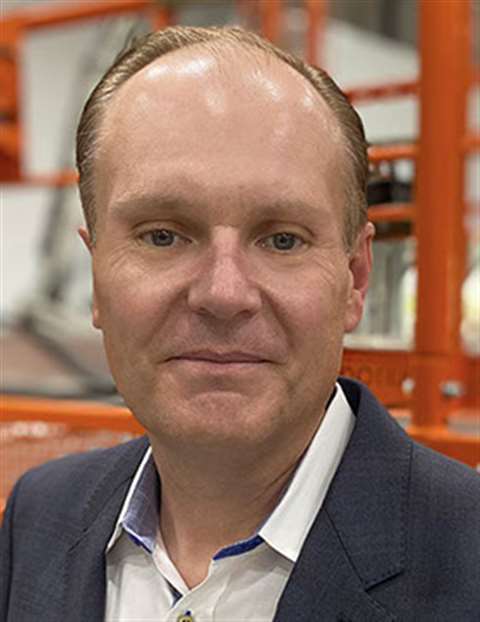 Matthew Elvin, Snorkel
Matthew Elvin, Snorkel
Matthew Elvin, CEO, Snorkel: Traditional lead acid batteries typically cost less than lithium-ion batteries. However, lithium-ion batteries offer higher energy density, are more efficient and last longer than lead acid batteries.
Energy density is the amount of energy that can be stored in a physical space. With a high energy density, lithium-ion batteries are able to discharge more stored energy than lead acid batteries, making them more efficient.
When measured in discharge cycles, lithium-ion batteries also last longer than lead acid batteries. Lithium-ion batteries have a better depth of discharge and can be used at a higher capacity before recharging. On the other hand, discharging lead acid batteries at more than 50% of its capacity can negatively impact the lifetime of the battery.
Since lithium-ion batteries have a higher efficiency, they can handle a higher amp to charge faster than lead acid batteries. The closer to full capacity, the slower lead acid batteries need to be charged to avoid overheating. Additionally, not fully recharging lead acid batteries could reduce its overall lifespan.
Justin Kissinger, marketing manager, Hy-Brid Lifts: Lithium-ion batteries seem to be the way of the future. With their development and growing use in the industry, they are more convenient for operators, providing faster charging, greater power capacity and longer lifetime and warranty. Lithium-ion technology also reduces maintenance by extending the time between battery replacement.
 Rebecca Yates, JCB
Rebecca Yates, JCB
While lithium-ion batteries offer many benefits, they do carry a higher cost, making them less appealing to price-sensitive customers. However, a long-term look at the rate of replacement will still show a lower cost over time.
Rebecca Yates, product manager – material handling, JCB: Lithium-ion can be a more productive and efficient energy source by allowing for longer run times, shorter charge times and greater overall battery life span.
ALH: Will lithium-ion solutions eventually replace lead acid batteries? Why or why not?
Begley: We don’t anticipate that flooded-lead acid batteries will be replaced altogether; however, we do see other types of battery power gaining popularity.
Flooded-lead acid (FLA) batteries have been around for quite some time. These types of batteries have relatively low-energy density, are slower to charge, require more ongoing maintenance, but are less costly than other types of batteries.
Lithium-ion batteries in comparison have high-energy density, faster recharging cycles and require less ongoing maintenance; however, they come at a higher price point. With electrification gaining momentum across the access industry, we anticipate the cost of lithium-ion battery technology to come down over time as volumes increase.
In addition, lithium-ion batteries offer environmental benefits over FLA batteries. They eliminate the risk of acid spills and outgassing concerns, making them better suited for work completed in environmentally sensitive areas like clean rooms, data centers and hospitals.
Connolly: As the costs continue to come down, it is a possibility. To be a feasible standard battery there will need to be confidence that the batteries will last the life of the machine, while still not inhibiting end of life disposal of the machine and the batteries themselves. The user also needs to be aware of the changes that may be required in recharge practices and recharge facilities themselves.
Elvin: While lithium-ion batteries present multiple benefits over lead acid batteries in terms of performance, charging stability, zero maintenance and overall lifespan, they are also currently a more expensive solution. While lithium-ion batteries can make commercial sense in larger equipment where the batteries are replacing an alternative power source, such as an internal combustion engine, the financial calculations are a little more challenging when replacing lead acid batteries with lithium-ion equivalents in smaller products, such as electric slab scissor lifts.
 Justin Kissinger, Hy-Brid Lifts
Justin Kissinger, Hy-Brid Lifts
However, as lithium-ion battery costs continue to reduce and we become more familiar with their benefits, such as zero battery maintenance which in turn releases valuable technician hours, there may become a point in future where lithium-ion batteries are a preferred solution in all types of electric equipment.
Kissinger: At Hy-Brid Lifts, we continue to develop and enhance our lift lineup. We plan to introduce lithium-ion battery options for our Pro Series and Zero-Turn lifts and expect demand to grow for this upgrade.
As lithium-ion technology advances and develops, the demand and convenience for operators grow. For example, a lift featuring telematics will provide battery information to fleet managers remotely. With this technology, operators and contractors have better insight to the health and life of their batteries.
Will lithium-ion completely replace traditional lead acid batteries? Probably not, or not immediately anyway. Lead acid batteries will remain the standard battery for Hy-Brid Lifts because some customers will always want the lower price.
Yates: Lead acid batteries benefit from significantly lower up-front costs compared to lithium-ion. So while many of lithium-ion’s benefits are in demand, it’s likely we will continue to see lead acid batteries in the market until lithium-ion becomes more cost effective.
ALH: What can we expect from your company in regard to electric scissor lifts in 2022?
Begley: We are always looking at ways to deliver greater value to our customers, and much of this comes through the introduction of new models with advanced features. In the past couple of years, this has included the world’s first all-electric scissor lift, the DaVinci lift, as well as JLG’s redesigned line of electric-powered rough terrain and electric rough terrain scissor lifts.
But, you asked about what’s coming from JLG in the future regarding electric scissors — we will keep details of that under wraps but will say that our organization has been offering electric lifts for decades, and we are heavily vested in advancing electric and alternative power across our product line.
Connolly: Skyjack will continue to optimize its electric scissor lifts in 2022 in response to new customer demands. New products will also continue to carry Skyjack’s recently introduced ECO label that details sustainability information in areas like operational carbon savings, duty cycle, and reduction of hydraulic connections. Skyjack’s ECO mark supports customers by providing products that deliver benefits in environmental performance and long-term sustainability which increases overall return on investment.
Elvin: Snorkel is planning to continue rolling out optional electric drive across its family of electric slab scissor lifts, which was introduced in 2020 on the new Snorkel S4740E. When purchasing a new unit, customers can choose between standard hydraulic drive, or option the unit with an efficient electric drive system.
Kissinger: At Hy-Brid Lifts, electric solutions are our company’s DNA. In addition to providing a lithium-ion battery option and continuing to develop our all-electric concept model, we plan to enhance electrification features on our lifts to provide customers with more options that improve their operations.
Yates: As a company firmly rooted in product innovation, JCB is always looking to expand our product offerings. JCB will continue developing and expanding its lineup of scissor lifts with electric drive to provide solutions to the challenges its customers face.
STAY CONNECTED



Receive the information you need when you need it through our world-leading magazines, newsletters and daily briefings.
CONNECT WITH THE TEAM








